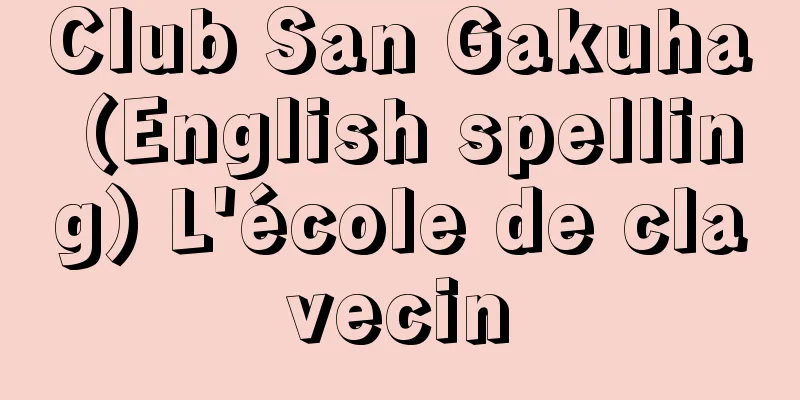Kainou Michitaka

|
Legal scholar and lawyer. Born in Iida, Nagano Prefecture, on May 30, 1908. After graduating from the Faculty of Law at Tokyo Imperial University in 1930 (Showa 5), he became an assistant professor at the same university, specializing in civil law and legal sociology. While studying the classics of Savigny, Jhering, and Gierke, he also cultivated the basic spirit of using law to benefit the people through rural surveys and other activities, forming a practical and wide-ranging academic style that is seen in his later legal studies of court battles and pollution. His achievements before World War II were summarized in "Research on Iriai" (1943), and after the war he worked as a lawyer at the International Military Tribunal for the Far East. Based on his experience, he wrote "Trials" (1951) and "Courtroom Techniques" (1952), among others, and contributed to the democratization of Japan's judicial system after the war. This continued throughout his life through his criticism of the Matsukawa Trial and many other essays and writings. He became a professor at Waseda University in 1949, a professor at Tokyo Metropolitan University in 1954, and a member of the Legislative Council, during which time he contributed to legal education, writing books such as "Challenges in Legal Sociology" (1951) and "Legal Lectures" (1952). In the Kotsunagi Incident, he defended the farmers, and published a record of his actions in the book "Konagi Incident" (1964). In 1968, he became the first director of the Tokyo Metropolitan Research Institute for Pollution, and contributed greatly to pollution research and administration. He passed away on March 22, 1975. [Atsushi Sato] Source: Shogakukan Encyclopedia Nipponica About Encyclopedia Nipponica Information | Legend |
|
法学者、弁護士。明治41年5月30日長野県飯田(いいだ)に生まれる。1930年(昭和5)東京帝国大学法学部を卒業後、同大学助手となり、民法、法社会学を専攻、サビニー、イェーリング、ギールケらの古典を研究するかたわら、農村調査などを通じて、法を民衆のために役だてるという基本精神を培い、後の裁判闘争や公害の法学的研究にみられる実践的で幅広い学風が形成された。第二次世界大戦前の業績は、『入会(いりあい)の研究』(1943)に集約され、戦後は極東国際軍事裁判の弁護士として活躍した。その経験に基づき『裁判』(1951)、『法廷技術』(1952)などを著し、戦後の日本の裁判制度の民主化に貢献した。それは松川裁判批判その他多くの論文・著作を通じて生涯続けられた。 1949年(昭和24)早稲田(わせだ)大学教授、54年東京都立大学教授、法制審議会委員などを歴任し、その間『法社会学の課題』(1951)、『法律講話』(1952)などを著し、法学教育にも尽くした。小繋(こつなぎ)事件では、農民の側にたって弁護に努め、その記録を『小繋事件』(1964)として世に問うた。68年に東京都公害研究所初代所長に就任し、公害の研究・行政面で貢献した。昭和50年3月22日没。 [佐藤篤士] 出典 小学館 日本大百科全書(ニッポニカ)日本大百科全書(ニッポニカ)について 情報 | 凡例 |
>>: Conceptual theory - Begriffsjurisprudenz (German: Begriffsjurisprudenz)
Recommend
Bougainville (English spelling) Bougainville, Louis-Antoine de
Born: November 11, 1729 in Paris Died: August 31, ...
Turning - Turning
This refers to the technique of turning wood on a ...
Eclipsing variable star
Also known as an eclipsing binary. A binary system...
Atsuta
A district in the southern part of Nagoya City. T...
"Umeyasu General Dog Warrior Tournament" - Umeyasu General Dog Warrior Tournament
...Other plays include the play "Keisei Eigh...
William Ferrel
American meteorologist. He contributed to theoret...
The Tale of Urihime - The Tale of Urihime
A story from the Muromachi period. Author unknown....
Medici, P.II de' (English spelling)
… [Hideo Katayama]. … *Some of the terminology th...
Pēneios (English spelling)
…Her name means “laurel tree.” She was the daught...
Turdinae
...The Turdinae also pass through in spring and a...
Albulidae
…It is occasionally caught off the coast of south...
satira
…Unlike simple criticism or accusation, it is oft...
The Capital of the Tycoon
…However, the British government was not initiall...
Wilson, W.
…In 1869, underwater football was played in Engla...
Duke of Gandia
...In fact, she is well known to locals as a phil...





![Takase [town] - Takase](/upload/images/67cc1d37959cc.webp)



